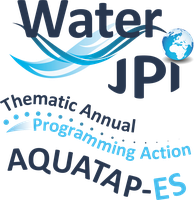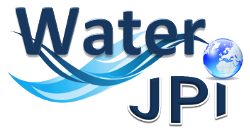Water JPI TAP on Ecosystem Services

The first Water JPI Thematic Annual Programming (TAP) action is on the topic of Ecosystem Services (SRIA sub-theme 1.1).
Funding Agencies
The national research funding agencies participating in this action are listed below.
The following countries which will take part in this joint action are:
- Finland (FL);
- Ireland (IE);
- The Netherlands (NL);
- Spain (ES).
Meet the TAP Network
Download the Water JPI AQUATAP-ES Who is Who Brochure
Rotating Scientific Coordinator
Miguel Ángel Gilarranz Redondo, Water JPI Vice Chair officially handed over the AQUATAP_ES Scientific Coordinator role from Mary Kelly Quinn to José María Bodoque del Pozo. Miguel on behalf of the group thanked Mary for her tireless effort and work in getting the network up and running and ensuring major achievements in such a short timeframe. He congratulated Jose, on stepping into the role and wished him well and continued success for the next 12 months. Further acknowledgment to Mary were voiced by Dominique Darmendrail (Water JPI Coordinator) and best wishes to Jose.
Meet the TAP Projects
- Complex eco-evolutionary dynamics of aquatic ecosystems faced with human-induced and environmental stress: Anna K. Kuparinen, University of Jyväskylä, Finland.
- Design of a methodology to increase flood resilience compatible with improved status of water bodies and sustainable management of water resources: José María Bodoque del Pozo, University of Castilla-La Mancha (UCLM) Spain.
- ESDecide: from Ecosystem Services Framework to Application for Integrated Freshwater Resources Management: Mary Kelly Quinn, University College Dublin (UCD) Ireland.
- Ecosystem services and Natural Capital for the large Dutch water bodies: Joost Backxs, Rijkswatestaat, The Netherlands.
- Spatial and temporal flow intermittency in fluvial ecosystems: effects on structure, function and ecosystem services: Vicenç Acuña, Fundació Institut Català de Recerca de l'Aigua Spain.
- The Diversity and Resilience of kelp ecosystems in Ireland: Kathryn Schoenrock, National University of Ireland Galway (NUIG) Ireland.
Outputs
AQUATAP-ES Briefing Note on Decision Support Systems
The Water JPI AQUATAP-ES network has released a Briefing Note on: Decision Support Systems for managing Aquatic Ecosystem Services, July 2021.
Aquatic Ecosystems Services (ES) are the goods and benefits that ecosystems provide to people and society. They are included in the concept of “Nature’s contribution to people” described by IPBES (2018). The ES approach seeks to understand and use this relationship between nature and people to support decisions contributing to global sustainability.
Decision Support Systems (DSS) are going to be more widely used in future in a wide variety of areas and confidence and trust in their performance is likely to increase. A DSS is a collection of (i) models (usually mathematical), (ii) its underlying data, (iii) appropriate analysis methods, (iv) relevant knowledge and (v) users that individually or in concert can assist in making informed decisions. In the case of AQUATAP-ES, these decisions relate to the management of water related ecosystems and the services they provide.
Decision Support Systems have a place in every aspect of policy formulation, implementation and in the operational management, including of aquatic systems. They can be used in both top-down and bottom-up configurations. This briefing note explains why DSS are needed to:
- assist water resource & catchment managers, and policy makers
- inform and support robust decision making to protect and sustainably manage our freshwater ecosystems.
It provides examples of current DSS’s and ones under development and also highlights what the way forward is for DSS into the future.
This briefing note focused on freshwater aquatic ecosystem services has been produced by the Water JPI AQUATAP-ES research network.
To download the briefing note click here
AQUATAP-ES Paper on UN SDG6
The Water JPI AQUATAP-ES network published a paper on UN Sustainable Development Goal dedicated to SDG6 entitled: Ecosystem Services Approach and Natures Contributions to People (NCP) Help Achieve SDG6 – January 2021.
This paper is published in a volume of the Encyclopedia of the UN Sustainable Development Goals dedicated to SDG6 “ensure availability and sustainable management of water and sanitation for all”. The authors explore how the ecosystem services approach and that of Natures Contributions to People (NCP) can help support achievement of this aim and more specifically the six targets set by this goal.
More information here
To download the publication click here
Reference: Kelly-Quinn M., Christie M., Bodoque J.M., Schoenrock K. (2021) Ecosystem Services Approach and Natures Contributions to People (NCP) Help Achieve SDG6. In: Leal Filho W., Azul A.M., Brandli L., Lange Salvia A., Wall T. (eds) Clean Water and Sanitation. Encyclopedia of the UN Sustainable Development Goals. Springer, Cham. https://doi.org/10.1007/978-3-319-70061-8_147-1
AQUATAP-ES Policy Brief
The Water JPI AQUATAP-ES network has released a Policy Brief entitled: ‘’Integration of the ecosystem services approach into policy & practice is key for the sustainable management of aquatic resources’’ October 2020.
Aquatic ecosystems provide services that yield essential goods and benefits that people and economies depend on. However, both freshwater and marine ecosystems are being degraded at alarming rates, resulting in declining biodiversity and ecosystem function, and consequently the quality of the good and benefits we derive. The goods and benefits provided by aquatic ecosystems have high economic and socio-cultural values and these needs to be communicated to people and integrated into policy. The ecosystem services approach captures the linkages between aquatic ecosystems and human wellbeing to support policy and practice to reverse declines. This policy brief is a step in communicating these important messages to improve the protection and management of our aquatic resources.
It is a communication tool to assist in particular policy makers in the water, biodiversity and climate arena by:
- highlighting the importance of the Ecosystem Services Approach;
- identifying the policy where the ecosystem services approach should be integrated
- presenting 6 steps on how to integrate the ecosystem services approach into the assessment and management of aquatic systems
The brief was produced following extensive national and international stakeholder consultation in early 2020.
To download the Policy Brief click here.
Workshops
Water JPI First TAP Kick Off Meeting
The Kick-off meeting took place on the 12th June 2019 in Dublin, Ireland and involved 21 participants from 16 organisations and 8 countries. Participants met to identify synergies and shared outputs that could be achieved over the 2-year lifetime of the TAP. Discussions were informed by learnings from the experience of FACCE-JPI TAP Soil and the details of the six participating project teams from Spain, The Netherlands, Ireland and Finland. Read More about the Workshop
Water JPI 2nd AQUATAP-ES TAP Action on Ecosystem Services Workshop
The second AQUATAP_ES workshop took place in Brussels on 19 November 2019 with 13 attendees from the various projects and the Water JPI community . Our Dutch colleagues hosted the workshop in their offices in Brussels. This workshop focused on discussing the relevant and appropriate stakeholders for mapping the impact of AQUATAP-ES TAP, and appropriate methods to communicate the outputs of AQUATAP-ES TAP. The main aim of this workshop was to identify ways of translating the Ecosystem Approach into policy and practice, generating a suitable knowledge transfer and communication/dissemination strategy for different target stakeholders. Read more about the workshop
Water JPI 3rd AQUATAP-ES Workshop Part I on Addressing Aquatic Ecosystems Services Data and Modelling needs
The first part of the third AQUATAP-ES workshop was originally due to take place in Madrid, but due to the global COVID-19 pandemic, this was changed to a half day virtual workshop on June 16th, 2020, Addressing Aquatic Ecosystems Services Data and Modelling needs. It was attended by 19 people including representatives from the six TAP projects from seven different countries. The workshop was hosted by the Irish Environmental Protection Agency (EPA).Read more about the workshop
Part II: 3rd AQUATAP-ES Workshop on developing guidance on developing decision-support tools for Aquatic Ecosystems Services
The second part of the third AQUATAP-ES virtual workshop ‘’Developing guidance on developing decision-support tools for Aquatic Ecosystems Services’’ took place October 8th 2020. Thirteen members from seven countries attended the workshop, made up of the existing AQUATAP-ES network group, members of the steering committee and the wider community of the Water JPI. The workshop was hosted by the Irish Environmental Protection Agency (EPA). Read more about the workshop
4th AQUATAP-ES virtual workshop
The fourth AQUATAP-ES virtual workshop ‘’Update on Water JPI AQUATAP-ES Final deliverables and up and coming events’" took place March 29th 2021. Sixteen members from seven countries attended the workshop, made up of the existing AQUATAP-ES network group, members of the steering committee and the wider community of the Water JPI. The workshop was hosted by the Irish Environmental Protection Agency (EPA). Read more about the workshop.
